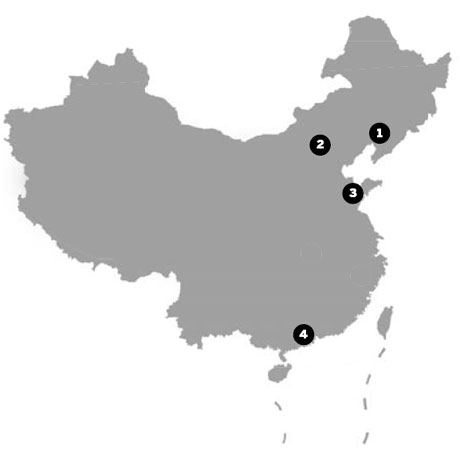IP Scene

1. Liaoning
Fund to aid invention patent application costs
Provincial authorities are offering financial aid to assist invention patent applications in Liaoning's intellectual property demonstration cities and counties this year.
The move aims to strengthen industries with strong intellectual property as well as support small and mid-sized enterprises with an edge in technological innovation, spur growth in the private sector and help in the province's transformation from its reliance on heavy industry, according to local authorities.
More than 14.8 million yuan has been distributed for nearly 20,000 patents in the province over the past four years.
With 20 percent annual average growth, invention patent applications increased from 4,368 in 2006 to 7,125 last year, ranking the province the seventh in the nation.
About 27 percent of 26,000 patent applications in the province last year were for invention patents, a bit higher than the national average of 26 percent.
Tiexi district in Shenyang along with a Manchu autonomous county in Benxi and economies in Wafangdian, Haicheng and Dashiqiao were named in the first group nationally for intellectual property practices.
2. Beijing
Flooring giants form new patent alliance
Jiangsu-based Dewei Wood Industry and Shenzhen's Yekalon Industry announced in mid-June that they will jointly found a national floorboard patent alliance.
The alliance enables members to share patents,
integrate information and technologies and improve innovation at reduced costs, said Xiao Luqing, secretary-general of the Patent Protection Association of China.
With core patented technologies in the industry, the organization aims to protect the interests of China's floorboard makers and increase their influence in the global market, industrial insiders said.
Through cross licenses, a patent pool and a shared information service system, the industrial alliance is also expected to provide technology and funds to assist members in international patent disputes, experts said.
Co-founders of the alliance have experience in international courts. Yekalon prevailed in unfair competition litigation against global flooring giant Uniln in a Germany court early this year, while Deweil won a three-year patent suit against a Spanish floorboard maker.
"Domestic companies should study international rules and value industrial associations to better be positioned in global competition," said Ge Yuejin, board chairman of Dewei.
7-Eleven logo fashionable enough to pirate?
Globally known convenience store 7-Eleven has filed a trademark complaint with the Beijing First Intermediate People's Court against Dexin Fashion Development Co Ltd from Jinjiang, Fujian province.
The store chain claims Jinjiang's registered trademark looks similar to its logo in both appearance and pronunciation and alleges "a malicious act of unfair competition".
The 7-Eleven trademark comprised of four colors - yellow, green, red and white and registered in China in 1987 - is widely known in many countries across the globe.
The court case follows rejection by the Trademark Appeal Board of 7-Eleven's opposition to Jinjiang's trademark.
The board said Jinjiang's trademark would be used for clothes and evidence presented did not prove 7-Eleven's trademark influence extends to the garment sector.
3. Shandong
Intellectual proprty expo in hometown of Confucius
The 10th China Patent High-tech Product Expo held between June 23 and 25 in Qufu, hometown of Confucius, saw agreements signed for 316 technological projects, 21.6 billion yuan in investment and 510 million yuan in transactions.
Some 600 higher learning institutions, research centers and high-tech companies participated in the three-day event to showcase a wide range of patented products including renewable energy, innovated materials, new medicine, machines and equipment, electronic information and advanced agriculture.
In addition to the latest technological innovations, the event hosted a job market and a series of forums on the capital market and startups.
4. Guangdong
Tencent No 3 on list of top 100 high-tech companies
Shenzhen-based Internet portal Tencent Inc, developer of the widely used online instant message application QQ, was ranked the third on Business Weekly's latest list of the world's best 100 high-tech companies, following only BYD and Apple.
After a survey of 6,500 tech firms, Business Weekly released the list on May 26.
Tencent is the only online Chinese company among the top 20.
Other Internet giants on the list include Yahoo Japan in 19th place, Google in 22nd, Baidu in 27th, Snda in 80th and B2W, a Brail-based electronic commercial portal, in the 96th.
Last year, Tencent was ranked seventh by Business Weekly.
More than 60 percent of Tencent's staff are involved in research and development.
The company had applied for nearly 2,800 patents by April 15, out of which 689 have been granted.
The majority of its patents are for Internet safety, storage technology, data mining, multimedia, Chinese processing and peer-to-peer distribution.
(China Daily 06/30/2010 page17)














